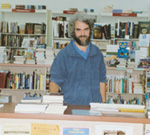- Categories:
The Toadstool Bookshops -- Thriving for 30 Years
 |
|
Willard Williams
|
When 19-year-old Willard Williams opened the Toadstool Bookshop in 1972 in his hometown, Peterborough, New Hampshire (population 5,000), he knew "absolutely nothing" about bookselling…. He does now.
Beginning with a $25,000 family investment and an 800-square-foot store, the business currently includes three Toadstool Bookshops, totaling 30,000 square feet, with 60,000 new titles overall and 40,000 used books -- in total, a $2 million operation. The business was created without further outside investments, and it has made a profit every year during the past three decades.
"Our biggest concern was what books we were going to put in the store, to have a better selection than anybody else had," Williams said. "For us, the more competitive aspect was what we stocked versus what other stores stocked. In those days, bookstores were not as involved in the community as they are now."
But a sufficient number of books couldn't be properly displayed in 800 square feet, especially when three-foot wide aisles ("one person to an aisle") and ramrod-straight shelving hid the bottom layers of books. If two people talked at the counter, he remembered, nobody else could do anything. Williams learned early that size was related to a critical mass that made new and used book sections work through eye-catching displays and easy browsing. After six years, he expanded into the 400-square-foot basement and later removed an unnecessary staircase to the second floor to add another 50 square feet, "which was dramatic!" Then, four years later, he added onto the side of the building to double the original 800 square feet.
Williams credits the New England Booksellers Association for providing connections to publishers and for teaching the skills he needed during this time. In addition, ABA provided the ABACUS Financial Survey, which was "extremely useful for budgeting expenditures. And now Book Sense is an amazing new cooperative phenomenon that is really working," Williams said.
In the beginning, three family members worked at the Toadstool one at a time and paid themselves $10 a day (Williams got the Christmas Eve shift). Word spread that the Toadstool had a broad, plentiful, high-appeal selection, and the store's customer base grew, both in numbers and in geographic range.
 |
|
Williams outside the Toadstool Bookshop, Peterborough, NH
|
In 1983, Williams opened a second Toadstool in a renovated, pre-Civil War textile mill that had been updated as Colony Mill Marketplace in Keene, New Hampshire (population 22,000), 25 miles west of Petersborough. In 1989, he opened a third store in Milford (population 12,000), 19 miles east of Petersborough. Next, in 1992, he moved the flagship Peterborough Toadstool into a 7,500-square-foot former A&P supermarket. The three Toadstools, employing 40 people today, are linked by Route 101 through wooded southwestern New Hampshire.
"We fairly quickly had 30,000 titles when most stores had 20,000," Williams said of the Peterborough branch. "We're still looking for the more literary titles, but also the things people are asking us for, which could be anything from unusual crafts books to poetry or travel books. I think that's one of the nice things about this area is that people have so many different interests. They supported us right off the bat."
Nevertheless, abiding by proven budgetary guidelines is a vital corollary to a well-targeted book selection. Williams aims for a budget that includes two percent of gross sales for marketing, 15 -16 percent for payroll, seven percent for rent in an overall budget geared toward a three to a four percent profit margin, all of which are vulnerable to current fluctuations. The steadfast guideline, he pointed out, has been to reinvest profits into the inventory.
For years, the Toadstools had been stocked with an astute, wide-ranging inventory, when, in 1990, a Barnes & Noble opened in Manchester, the state's largest town (population 100,000), 36 miles away.
The behemoth "changed the dynamics entirely," Williams said in his low-key way, "not so much to the distance of the store itself but to the perception of people. After this, people would walk into our store and not be so amazed. They were always pleasantly surprised that we had these books, but it wasn't the amazement of a big array of books because that was beginning to happen in the big superstores."
The importance of the critical-mass size of the Toadstool stores came to the fore: "We realized we had to keep making the store bigger in terms of definitely having more space. We still had enough titles just jammed in there, but people weren't aware of it. A lot of people's perceptions today are based on the physical space involved, even though the number of titles may not be that much bigger."
 |
|
Inside the Toadstool Bookshop
|
While Williams considers Keene too small for a superstore, attempting to preempt a national chain with incremental expansions of the Toadstool is a conscious, secondary business move; expansion is always considered first in terms of a response to needing more space. "We could hold the inventory at current numbers or reduce it," he said, "and say these are the confines in which we will have to live. Or we could take on some additional space, which is also taking on some additional risk in terms of additional rent we'd have to pay. One of the reasons for doing that was to make the store competitively better and capable of dealing with a larger store."
For Williams, firsthand selection of books parallels the critical mass of size. As the Toadstool expanded into three branches and continuing individual expansions, Williams noticed more sales reps called on him. "From what I hear," he said, "they come to see us because we have three stores. Otherwise, we probably would have telephone sales reps, which I would have found hard to deal with. I really like the presentation of the book, the chance to hear what the sales rep has to say about the book. You can get a much better sense of how good the book is and their own enthusiasm for the book."
He continues to deal with independent commission reps. "I think they're really important to us," he said, "because their books add uniqueness and variety to our inventory and are important for us to carry." Independent rep Jim Beardsley, now with Marcia Beardsley of Beardsley Associates, called on Williams from the beginning. Representing Barre Publishing, Beardsley worked with Williams at the first Lilliputian Toadstool and "it was pretty crowded!" he said, adding that "Willard's really an old-fashioned book person. Such a gentle man. I always thought he was instinctively knowledgeable about the book business."
When the Toadstool increased in size and branches, Beardsley said, "It was always the same Willard, thank God. He's just been the most wonderful person to work with. He always stops for you, he's patient. He really does know his market, he knows his customer."
John Lovejoy, independent rep from Wilbraham, Massachusetts, also has known Williams throughout the past 30 years and described him as someone who "never shied from the challenge. I always admired his business acumen. He's a landmark in New England."
In recent years, Williams has seen another radical change: wholesalers providing overnight delivery, which has altered customer perceptions. Today, he points out, if a special order takes three weeks, as some did in the past, customers say that they will look somewhere else, which usually means from an online bookseller. "At first," Williams recalled of the online competition, "it was scary. But more scary to me were the electronic books, being able to download whenever you wanted. It may still come. Generally speaking, people say they don't like the idea."
Another conspicuous change during the past 30 years, Williams said, is the expansion of conversation about books: "Almost everywhere you turn on the radio or television, or just in conversation, people are talking much more about books than I ever remembered. I think it's public radio that's brought a lot of that. You can turn on the radio anytime during the day and somebody is talking about a book. Books are so related to events taking place or have practical aspects, or are fiction that relate to their lives. That has really bumped book sales a lot."
People favor the direct social element of bookstores, including those who get lost in quiet corner sections. Bookstores, he noted, have become gathering places (the Peterborough Toadstool has a cafe) where books engender a camaraderie among people who read and discuss their discoveries. "I love it when someone comes in and finds a title they never would have expected in a small town," he said. "I think everyone who works here likes that. We love it when we hear someone exclaiming over a book that they found and looked forever for."
In the end, Williams holds, book selection is the key. He tells of one woman who found a refuge after work in the spirituality section of the first 800-square-foot Toadstool. "Ten years ago she told me it saved her life," he said. "Literally, that is what she said. It kept her sane. She couldn't go home without having that chance to come in and browse through that section." --Steve Sherman

